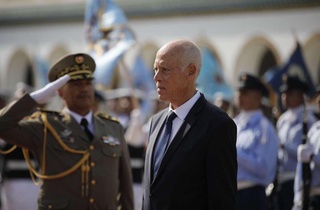Saied stressed his respect for the constitution, noting the possibility of introducing amendments so as to meet the aspirations of the Tunisian people.
He also indicated that a government would be announced as soon as possible.
On July 25 in light of violent demonstrations against the government demanding the improvement of basic services and amid a growing COVID-19 outbreak, Saied suspended parliament for thirty days and relieved prime minister Hichem Mechichi from his duties, waiving the immunity of the parliament members and ordering the military to close the parliament house.
Saied's actions, which included relieving the prime minister of his duties, assuming the executive authority, suspending the Parliament and closing the offices of some foreign news agencies, appeared to have been clear signs of a coup, as they disregard Article 80 of the Tunisian constitution which states that before raising an emergency state, the president must consult his prime minister and the head of the Parliament, and even then, the Parliament cannot be suspended.
There is currently no constitutional court in Tunisia to offer jurisdiction in his interpretation of the constitution.
On 24 August, Saied extended the suspension of parliament although the constitution states the parliament can only be suspended for a month, raising concerns in some quarters about the future of democracy in the country. (ILKHA)



 Dünya
Dünya
 Dünya
Dünya
 Güncel
Güncel
 Güncel
Güncel
 Dünya
Dünya
 Dünya
Dünya
 Dünya
Dünya
 Güncel
Güncel
 Güncel
Güncel
 Güncel
Güncel





